Aboriginal and Torres Strait Islander Outcomes
The Education Directorate provides a range of supports, programs and initiatives dedicated to Aboriginal and Torres Strait Islander students and staff. Our vision is for schools that meet the needs and aspirations of all Aboriginal and Torres Strait Islander students and we are working towards achieving this through building cultural integrity.
Cultural integrity represents a break from past approaches which have focussed on deficit mindsets. It engages a strengths-based attitude to growth and achievement. It is positive and constructive, and benefits the whole school community. The 2016 review of Aboriginal and Torres Strait Islander education in the ACT found that the cultural supports available to students can make a significant difference to their experience at school.
Cultural integrity describes the environment a school creates to support Aboriginal and Torres Strait Islander students, and to welcome and engage their families and communities. Every school’s story and community is unique, so cultural integrity will mean something different to each school.
The whole school community will benefit from higher cultural integrity, with Aboriginal and Torres Strait Islander perspectives embedded throughout teaching and learning, and into the physical school environment.
Implementation of the Student Resource Allocation Program (SRA) has been a key driver behind the new focus on cultural integrity and has been supported by a number of key advisory groups. The SRA Principal Advisory Group, SRA Aboriginal and Torres Strait Islander Policy Group and SRA Reference Board have all contributed to the development of new policy direction to support cultural integrity in schools. The main objective of these groups is to ensure that community and schools’ perspectives are reflected in strategic directions, project planning, policy development and shaping the design and delivery of support services associated with implementing the SRA.
ACT public schools deliver a broad range of programs to meet the learning needs, interests and aspirations of all students. Increasing student attendance and year 12 attainment rates and improving performance in NAPLAN and other assessments are key performance indicators for the Directorate. Personalised learning and increased transitions and careers support is available to all students. These provide formal and informal pathways into education, employment and self-development for Aboriginal and Torres Strait Islander students. Programs include the Aboriginal and Torres Strait Islander Student Aspirations Program and Flexible Learning Options which help students develop a connection between their future study, training and work goals, as well as a significant number of localised initiatives within schools to enable Aboriginal and Torres Strait Islander students to achieve their hopes and aspirations.
During 2016-17, 88 students participated in Student Aspirations Program activities including pathways interviews, the years 5 and 6 Leadership Day and the Halogen Youth Day. The Student Aspirations Program aims to support students to successfully navigate career and educational pathways. Students in the Aspirations Program also participate in the annual Leadership Day at Birrigai.
The Directorate’s Koori Preschool Program supports increased participation of Aboriginal and Torres Strait Islander children in preschool through the provision of high quality early childhood education at five sites across Canberra:
- Ngunnawal Primary School;
- Wanniassa School;
- Richardson Primary School;
- Narrabundah Early Childhood School; and
- Kingsford Smith School.
Children from birth to three years can attend a Koori Preschool when accompanied by a parent or guardian, enabling greater family involvement and supporting transition to formal schooling. In addition to enrolling in Koori Preschool, children can also attend their local preschool, providing access of up to 27 hours per week of high quality preschool education in the 18 months prior to starting kindergarten.
The number of preschool enrolments of Aboriginal and Torres Strait Islander children in public schools includes children who were attending a preschool program at a specialist school and as an early entry student, as at August census of a given year.
The number of Aboriginal and Torres Strait Islander children enrolled in public sector preschool increased over the last five years. In 2016, 251 children were enrolled, exceeding the target of 231 enrolments (Figure B1.1).
Figure B1.1: Number of enrolments of Aboriginal and Torres Strait Islander children in preschool in public schools, 2012 to 2016
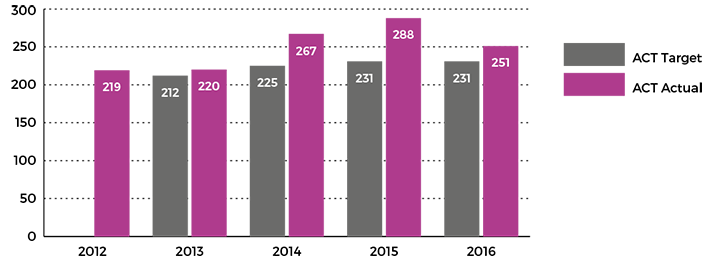
Source: ACT Education Directorate
The Action Inquiry Program operated across ACT public schools from 2010 until 2016. The program delivered professional learning and support for teachers and school leaders to conduct school projects to improve the educational outcomes of Aboriginal and Torres Strait Islander students.
Thirty teachers from 11 campuses (early childhood to college settings) participated in the 2016 Action Inquiry Program. Approximately 260 Aboriginal and Torres Strait Islander students were enrolled in the participating schools.
Inquiries in 2016 included a longitudinal numeracy study, oral language initiatives, supporting transitions into Science, Technology, Engineering and Mathematics (STEM) subjects and literacy support in upper primary.
It is important that Aboriginal and Torres Strait Islander students are able to see themselves and their cultures reflected in all learning areas. The Aboriginal and Torres Strait Islander Histories and Cultures cross-curriculum priority of the Australian Curriculum is designed for all students to learn about the histories and cultures of Aboriginal and Torres Strait Islander people and their contributions to contemporary Australian society. The priority encourages all staff and students to engage in reconciliation and build school capability to embed local Ngunnawal histories and cultures in the school curriculum.
In the 2016-17 financial year, $230,000 was allocated to the tutorial support scheme program to implement targeted strategies to meet the individual learning needs of Aboriginal and Torres Strait Islander students. Funding is used for staffing costs in order to deliver one-on-one, small group tuition or study groups to provide more intensive learning support where required.
In 2017, the Aboriginal and Torres Strait Islander Secondary Scholarship Program was expanded to include scholarships for students wishing to pursue Vocational Education and Training (VET) pathways. In March 2017, eight Secondary Scholarships were awarded to students in years 11 and 12 pursuing degrees in health and teaching as well as VET pathways.
In February 2017, six Tertiary Scholarships were awarded to students pursuing degrees in health and teaching. As part of the Tertiary Scholarship Program, scholarship holders undertook a voluntary placement in a school and were then given the opportunity to work as casual Learning Support Assistants. In 2016-17, scholarship recipients undertook casual employment in eight ACT schools.
Some other important programs and highlights for 2016-17 are outlined below.
Strengthening and Promoting Ngunnawal Culture And History In Schools
The 2016-17 election commitment ‘Better Schools – Strengthening and Promoting Ngunnawal Culture and History is a two year program to support schools and students to engage with the Traditional Owners and incorporate Ngunnawal culture across all ACT public schools. The initiative provides funding sourced from existing resources of $300,000 over two years. The following initiatives have been implemented across a number of schools during 2016-17:
Ngunnawal Plant Use guide pilot program
In 2017, nine schools were supported to participate in a pilot program to develop teaching and learning programs using the Ngunnawal Plant Use Guide. Resources and strategies were shared with other schools. The book includes an introduction to Ngunnawal history and natural resource use, descriptions and photos of 69 plant species, including their use, distribution and method of propagation.
Footprints on Our Land: Aunty Agnes, Ngunnawal Elder pilot program
In 2017, the Directorate led a series of workshops and school based projects to develop teaching and learning activities based on the film about Aunty Agnes, Footprints on Our Land. In March 2017, six schools presented their strategies to incorporate the DVD into professional learning and classroom activities. Areas of learning and teaching focus include background on Ngunnawal history and culture, cultural awareness among staff and students, cross curriculum perspectives, rights and freedoms and English.
Mununja the Butterfly
In May 2017, four primary schools commenced a curriculum pilot project to explore ways in which to incorporate Don Bell’s book, Mununja the Butterfly into learning activities and programs for upper primary students.
Embedding Indigenous languages and cultural competence in schools
During the reporting period, the Directorate distributed posters and other literacy resources to promote the incorporation of Indigenous Languages in teaching and learning programs in ACT public schools, including resources promoting the 2017 NAIDOC week theme, Our Languages Matter.
The Directorate has also conducted Cultural Competence Workshops with school and Education Support Office Staff. The purpose of these workshops is to promote cultural integrity in schools and the workplace. The workshops are completed in conjunction with an online Cultural Competence Course promoting cultural integrity and promoting Aboriginal and Torres Strait Islander history and culture.
During the facilitation of some Cultural Competence workshops, Acknowledgement of Country has been spoken in the Yuwaalaraay language, with an accompanying explanation of the difference between Acknowledgement of Country and Welcome to Country and the importance of Acknowledgement of Country in making the connections between, people, Country, place and culture. Schools involved in the Cultural Competence Course have also been made aware of Aboriginal Language Resources available for purchase.
Aboriginal and Torres Strait Islander Centre for Excellence – Campbell High School
Established by award winning teacher Cara Shipp, the Centre for Excellence at Campbell High School has a number of programs and initiatives in place to support Aboriginal and Torres Strait Islander students, including the following:
- a program for students to become leaders and role models in the community and access pathways to further education and employment after finishing school;
- learning activities including yarning circles, outdoor activities connecting with land, hands-on and art-based activities as well as intensive literacy and numeracy practice; and
- personalised learning plans are developed in collaboration with each student and their parents/carers.
Melrose High School Indigenous Studies Centre
The Indigenous Studies Centre at Melrose High School is open every lunchtime to provide support for Aboriginal and Torres Strait Islander students who may need assistance with classwork, assignments and any other school activities. The Centre also runs regular excursions, parent lunches, and celebrates significant cultural events such as NAIDOC week. Staff members also work with students to develop and deliver workshops to their peers about Aboriginal and Torres Strait Islander culture.
Melrose High School also runs the Big Picture Academy, which is an innovative learning program for Aboriginal and Torres Strait Islander students in years 9 and 10. Students are able to study in subject areas that they are passionate about, and learn what it is like to work in their industry of interest through internships in professional working environments. The program also connects students to Aboriginal and Torres Strait Islander mentors already working in the local community in the same field.
Wanniassa School – GAMBRA Program
The Gambra Program provides a space where Aboriginal and Torres Strait Islander students are able to learn more about their culture, complete extra study and receive tutoring as required. The program also fosters parental engagement by encouraging families to participate in Gambra activities.
Mura Achievement Awards
The Student Aspirations Mura Award recognises Aboriginal and Torres Strait Islander students in years 4 to 11 for demonstrating one or more of the following:
- excellent attendance;
- strong commitment to their learning;
- greatly improved engagement in their learning;
- good academic progress; and/or
- active involvement in the community and/or extra-curricular activities.
In 2016, 72 Mura Awards were awarded. Recipients receive a small bursary to go towards educational costs.
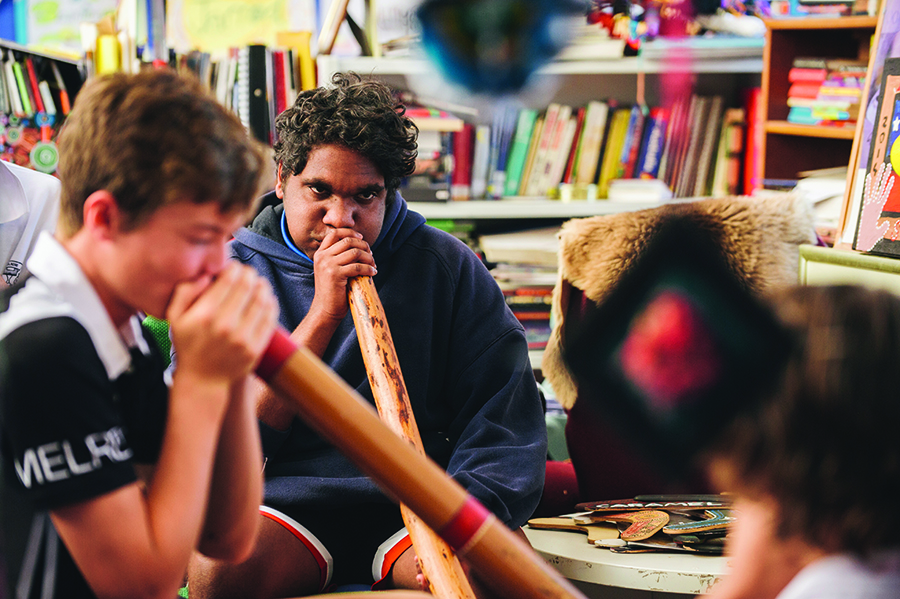
The National Assessment Program – Literacy and Numeracy (NAPLAN) is one of the measures that assist the Directorate to assess performance in quality learning for Aboriginal and Torres Strait Islander students. The performance of year 5 and year 9 Aboriginal and Torres Strait Islander public school students in reading and in numeracy is demonstrated by the mean achievement scores in NAPLAN.
In 2016, the ACT consistently had a higher proportion of Aboriginal and Torres Strait Islander students achieving at or above the national minimum standard (NMS) for both reading and numeracy compared with national results. For years 5 and 7 reading, the difference was greater than 10 percentage points.
However, in the ACT, and across Australia, the mean scores for Aboriginal and Torres Strait Islander students were significantly lower than the mean scores for non-Aboriginal and Torres Strait Islander students across all year levels and all testing domains.
The Directorate recognises that there is more to be done to achieve better results for Aboriginal and Torres Strait Islander students, and is providing further wrap-around support by creating learning environments of cultural integrity which support leadership, high expectations and successful pathways for students.
Many ACT public schools have also implemented a variety of programs, initiatives and centres to provide individualised support to students who may require further literacy, numeracy or other learning support.
The below data shows that from 2012 to 2016, there was no significant change in the NAPLAN performance of Aboriginal and Torres Strait Islander students in ACT public schools in either reading or numeracy (Figures B1.2-B1.5). Nationally and in the ACT, results for Aboriginal and Torres Strait Islander students were two to three years of schooling behind non-Indigenous students.
During 2017-18, the Directorate will be working to develop indicators to better measure equity and gain in student NAPLAN performance. The development of revised indicators will include consultation at the national level. The Future of Education conversation will also play an important role in developing new indicators.
Figure B1.2: Mean achievement score of all Year 5 Aboriginal and Torres Strait Islander public school students in reading in NAPLAN, 2012 to 2016
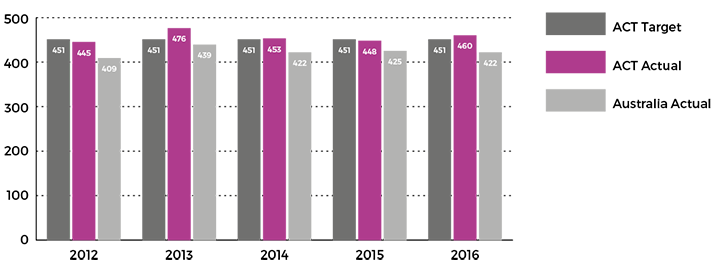
Source: Australian Curriculum, Assessment and Reporting Authority, National Assessment Program – Literacy and Numeracy 2012 to 2016
Figure B1.3: Mean achievement score of all Year 5 Aboriginal and Torres Strait Islander public school students in numeracy in NAPLAN, 2012 to 2016
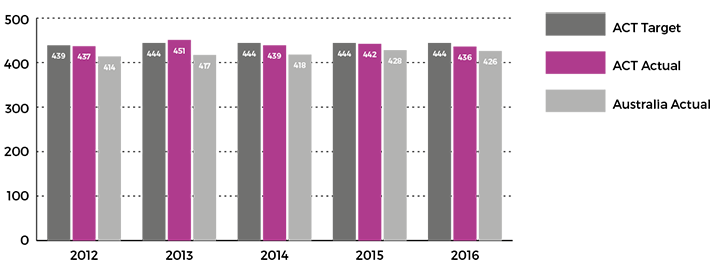
Source: Australian Curriculum, Assessment and Reporting Authority, National Assessment Program – Literacy and Numeracy 2012 to 2016
Figure B1.4: Mean achievement score of all Year 9 Aboriginal and Torres Strait Islander public school students in reading in NAPLAN, 2012 to 2016
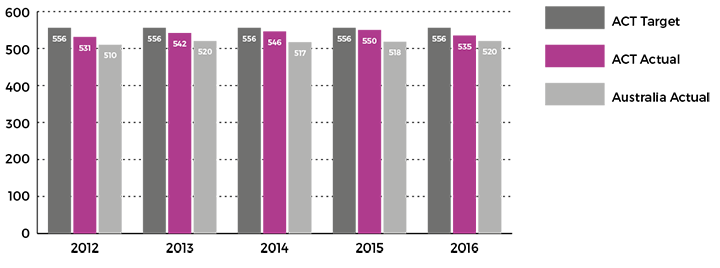
Source: Australian Curriculum, Assessment and Reporting Authority, National Assessment Program – Literacy and Numeracy 2012 to 2016
Figure B1.5: Mean achievement score of all Year 9 Aboriginal and Torres Strait Islander public school students in numeracy in NAPLAN, 2012 to 2016
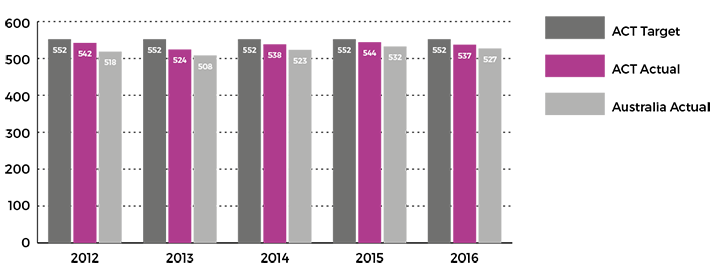
Source: Australian Curriculum, Assessment and Reporting Authority, National Assessment Program – Literacy and Numeracy 2012 to 2016
An indicator of stakeholder confidence in public education is the retention of year 10 students in public schools to year 11 in public colleges. The percentage of year 10 Aboriginal and Torres Strait Islander students who proceed to public secondary college education reports the total number of year 10 Aboriginal and Torres Strait Islander students in public high schools, as at the August census, who enrolled in year 11 at public colleges as at the February census in the following year. The percentage of year 10 Aboriginal and Torres Strait Islander students who continued on to college education has exceeded the target of 80 percent since 2013-14 and remained relatively stable over the last four years (Figure B1.6).
Figure B1.6: Percentage of Year 10 Aboriginal and Torres Strait Islander students who proceed to public secondary college education, 2012-13 to 2016-17
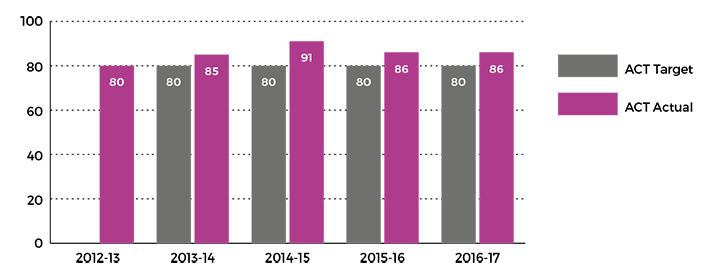
Source: ACT Education Directorate
Year 12 certification for Aboriginal and Torres Strait Islander students is the number of students who meet the requirements of an ACT Senior Secondary Certificate, expressed as a percentage of Aboriginal and Torres Strait Islander year 12 enrolments. Data are obtained from the ACT Board of Senior Secondary Studies and the ACT School Census undertaken in February of each year.
Since 2014, the proportion of Aboriginal and Torres Strait Islander students achieving a Senior Secondary Certificate has trended upwards from 59 percent in 2014 to 73 percent in 2016. In 2016, 64 (of 88) Aboriginal and Torres Strait Islander students achieved an ACT Senior Secondary Certificate. Through positive pathways and engagement programs, the Directorate is committed to increasing the proportion of Senior Secondary Certificate recipients (Figure B1.7).
Figure B1.7: Percentage of Aboriginal and Torres Strait Islander public school students who received a Year 12 Certificate, 2012 to 2016
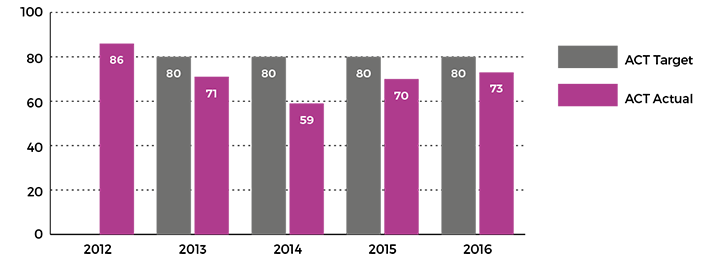
Source: ACT Education Directorate, ACT Board of Senior Secondary Studies
The percentage of year 12 Aboriginal and Torres Strait Islander students receiving a nationally recognised vocational qualification is the number of year 12 Aboriginal and Torres Strait Islander students who completed
year 12 and achieved a vocational qualification, or equivalent, divided by the total number of Aboriginal and Torres Strait Islander students enrolled in year 12 at the February census of a given year. Data is obtained from the ACT Board of Senior Secondary Studies and the Directorate’s School Census undertaken in February.
The reduction in numbers of Aboriginal and Torres Strait Islander students receiving a nationally recognised vocational qualification in 2016 was due to reductions in the number of students undertaking a vocational qualification (Figure B1.8). This is consistent with national trends for vocational education and training (VET) in Schools, which showed a small decrease in student numbers in 2016, but a general upward trend in student numbers over the past 20 years.
Figure B1.8: Percentage of Year 12 Aboriginal and Torres Strait Islander students who received a nationally recognised vocational qualification, 2012 to 2016
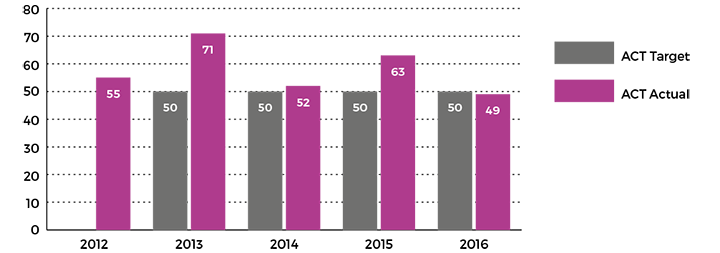
Source: ACT Education Directorate, ACT Board of Senior Secondary Studies
The completion of a Tertiary Entrance Statement is another measure that can lead to improved further education and employment outcomes for Aboriginal and Torres Strait Islander students. The percentage of year 12 Aboriginal and Torres Strait Islander students receiving a Tertiary Entrance Statement is the number of year 12 Aboriginal and Torres Strait Islander students who completed year 12 and achieved a Tertiary Entrance Statement, divided by the total number of Aboriginal and Torres Strait Islander students enrolled in year 12 at the February census of a given year. Data is obtained from the ACT Board of Senior Secondary Studies and the Directorate’s School Census undertaken in February.
The percentage of Aboriginal and Torres Strait Islander students receiving a Tertiary Entrance Statement has increased steadily since 2014, and has exceeded the target in 2016 (Figure B1.9).
Figure B1.9: Percentage of Year 12 Aboriginal and Torres Strait Islander students who received a Tertiary Entrance Statement, 2013 to 2016
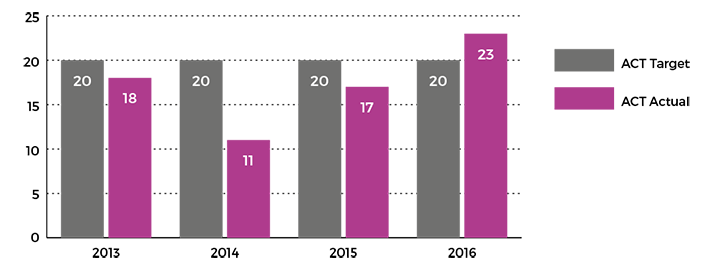
Source: ACT Education Directorate, ACT Board of Senior Secondary Studies
The Directorate has a number of mechanisms and strategies in place to build and sustain meaningful partnerships with representatives from the local Aboriginal and Torres Strait Islander community. During the reporting period, the Director-General and other senior executive met regularly with the ACT Aboriginal and Torres Strait Islander Elected Body representative for Education, Mr Tony McCulloch. The Directorate’s regular meetings with Mr McCulloch during 2016-17 provided a valuable forum for discussion and resolution of key issues in education, such as needs based funding, student attendance, Aboriginal and Torres Strait Islander employment targets, Ngunnawal language and culture in schools, and how to improve student performance and outcomes. The Directorate also continued to support the operation of the ACT Aboriginal and Torres Strait Islander Education Consultative Group.
Developing cultural integrity requires everyone’s input and support. Throughout 2016-17, the Directorate has undertaken a number of initiatives to engage Aboriginal and Torres Strait Islander and non-Aboriginal and Torres Strait Islander staff in change.
The theme of the Directorate’s third Reconciliation Action Plan (RAP) is Reconciliation – Keeping it Alive 2016 – 2018. The RAP was launched on National Sorry Day, 26 May 2016. The purpose of the RAP is to engage all employees in the creation of an organisational culture enriched by the diversity and knowledge of Aboriginal and Torres Strait Islander peoples, strengths and cultures through our common values.
In February 2017, the Directorate installed on the façade of the Hedley Beare Centre for Teaching and Learning the painting Water Dreaming by the artist Leah Brideson from our Reconciliation Action Plan as a demonstration of the Directorate’s commitment to Reconciliation.

To provide further support for Aboriginal and Torres Strait Islander staff, the Directorate has an Aboriginal and Torres Strait Islander staff network. The staff network meets quarterly and is used as a safe space for staff to connect and support one another. Members from the network regularly attend meetings with the Senior Executive Team to provide insight and feedback on current issues or initiatives within the Directorate.
In 2017, the Directorate introduced an Aboriginal and Torres Strait Islander Mentoring Program (the Program). The Program gives Aboriginal and Torres Strait Islander staff at all levels the opportunity to work with colleagues to further their networks and careers within the Directorate.
To support professional learning, 43 teachers from 12 schools participated in the Cultural Competency program in semester 1, 2017. The program combines completion of 10 online modules provided by the Centre for Cultural Competence Australia with three workshops designed and facilitated by the Aboriginal and Torres Strait Islander Education Section and external specialist staff.
The Directorate awarded six Aboriginal and Torres Strait Islander Tertiary Scholarships, five for students studying teaching and one for a student studying an approved health course. As part of the Tertiary Scholarship Program, scholarship holders undertake a voluntary placement in a school and are then given the opportunity to work as a casual Learning Support Assistant. In 2016-17 scholarship recipients undertook casual employment in eight
ACT schools.
The continuing increase in numbers of Aboriginal and Torres Strait Islander staff from 2016 to 2017 (Figure B1.10) reflects the Directorate’s commitment to building cultural integrity, and putting in place the strategies discussed above to support staff.
Figure B1.10: Number of Aboriginal and Torres Strait Islander staff, 2012 to 2017
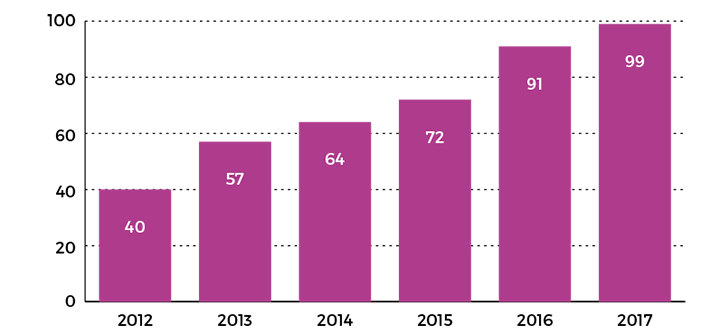
Source: ACT Education Directorate
Awards and Recognition
2016 ACT Public Education Awards
The ACT Public Education Awards acknowledge school leaders, teachers, leadership in Aboriginal and Torres Strait Islander education, support staff, partnerships and volunteers. In addition, several employees were recognised for their valuable contribution to ACT public schools for over 40 years of service.
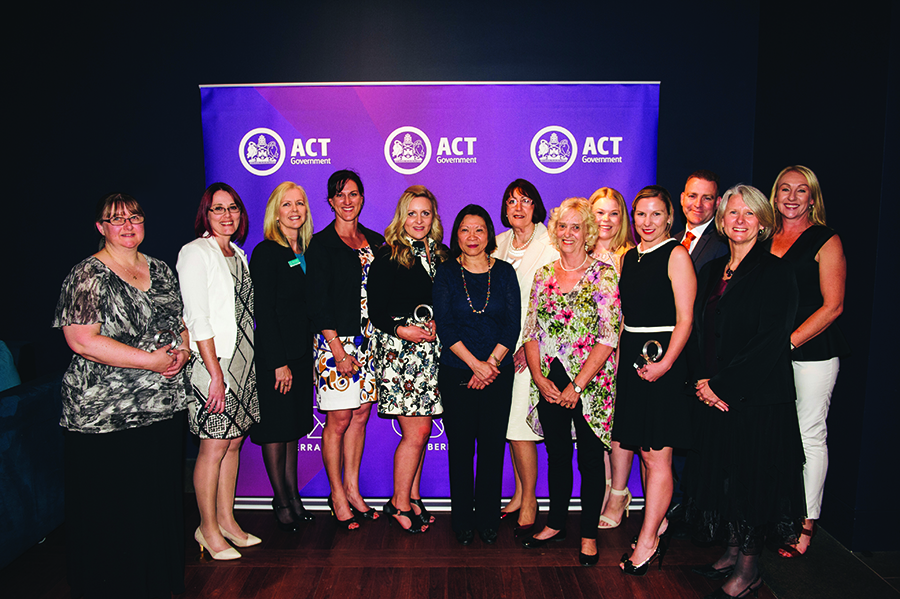
- Education Support Person of the Year – Hao Thai, Giralang Primary School;
- Volunteer of the Year – Christine Tusch, Fraser Primary School;
- New Educator of the Year – Laura Pardoe, Harrison School;
- Early Childhood Teacher of the Year – Sascha Colley, Ainslie Primary School;
- Primary Teacher of the Year – Iesha Siotis, Turner Primary School;
- Secondary Teacher of the Year – Susan Daintith, Campbell High School;
- Outstanding Partnership of the Year – Hughes Primary School with Woden Community Service;
- Leadership in Aboriginal and Torres Strait Islander Education – Cara-Jane Shipp, Wanniassa School; and
- Outstanding School Leader of the Year – Matthew Holdway, Theodore Primary School.
The following recipients were presented Recognition of Service Awards at the event:
- Wally Hoefel;
- Christine Hynes;
- Alan Loryman;
- Jennifer Macdonald;
- Juanita Morton;
- Margaret Rowlands;
- Andy Wardrop;
- Heather Wardrop; and
- Dougal Whitton.
2016 Year 10 Excellence Awards
The Year 10 Excellence Awards celebrate the achievements of ACT public school students in one of the following
categories: a successful learner, a confident and creative individual, or an active and informed citizen.
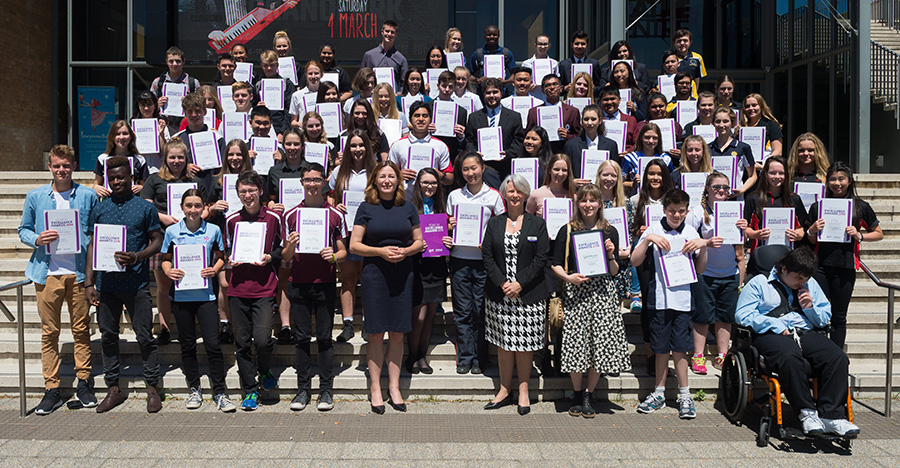
The recipients from the 2016 Year 10 Excellence Awards show the depth of talent in our public schools in areas such as academic excellence, perseverance, sportsmanship, artistic and musical ability, integrity and leadership.
These year 10 students from ACT public high schools are acknowledged for their outstanding achievements in their high school years.
Of the 2,750 ACT public school students who graduated from year 10 in 2016, 73 were recognised on at the Year 10 Excellence Awards for Outstanding Achievement in the High School Years. The awards represent the culmination of many years of hard work, dedication, success and community service. The recipients have demonstrated qualities of academic excellence, creativity, sporting prowess and a keen desire to contribute to the world, beginning in their own backyards.
Australian Council for Education Leaders ACT Branch Awards 2016
The Australian Council for Educational Leaders ACT Branch Annual Awards presentation honoured a number of our public education leaders, acknowledging their excellent leadership in implementing an educational initiative, conducting research and/or influencing educational policy leading to improved educational outcomes for students in any educational setting.
Growing in Leadership Award:
- Meghan Adamson – Kingsford Smith School; and
- Margaret Wigley – Canberra College.
Leadership Award:
- Peter Kent – Deputy Principal, Gordon Primary School;
- Crystal Mahon –Executive Teacher, Hawker College; and
- Rachel Matthews – A/g Principal, Torrens Primary School.
2016 Resilient Australia Awards For
Act Education

The Education Directorate gained two awards in the government category of the Resilient Australia Awards for 2016.
The first award saw the Education Directorate take out the overall winner of the ACT Resilient Australia Awards for Natural Disaster Evacuations in Specialist Schools and was presented by Simon Corbell, Minister for Emergency Services, at the Legislative Assembly.
The second award was ‘Commended’ for production of a training video demonstrating that sound planning and effective communications, ensures ACT specialist schools safety in effectively conducting emergency evacuations.
Following the ACT Disaster Resilient Awards, the Education Directorate was invited to attend the Resilient Australia National Awards ceremony which was held in Melbourne on 17 November 2016.
The national awards were attended by Megan Young, Senior Manager of Security and Emergency Management, Jennie Lindsay, Principal of Malkara Primary School and Margaret Head, Assistant Manager Security and Emergency Management.
Australian Scholarships Group National Excellence in Teaching Awards 2016
For more than 23 years, the Australian Scholarship Group National Excellence in Teaching Awards have given communities in Australia and New Zealand the opportunity to formally recognise and thank outstanding teachers.
Lyn Cleaver, from Gowrie Primary School, was one of 12 exemplary educators from across Australia honoured for their inspiring contribution to teaching. Lyn’s award was for innovation.
Lyn believes early childhood teaching is not only an opportunity to educate students, but also to support them, and their families, through the foundation years of their learning journey. She leads the kindergarten teaching team at Gowrie Primary School, with the aim of instilling a lifelong love of learning, and preparing students for the transition to formal schooling.
Lyn recognises that each student is embarking on a unique learning journey and personalises education through daily goal setting and conferencing. She utilises circle time as a means of developing social skills, confidence and strong relationships in her classroom. She also communicates freely with families, and welcomes parents into the classroom to learn valuable strategies to continue their child’s education journey at home.
Lyn regularly reflects on her practice and makes adaptations, seeking new tools, strategies and information based on her students’ needs. She sees education as an ever changing profession and believes it is important to keep up-to-date with innovative, best practice techniques.
